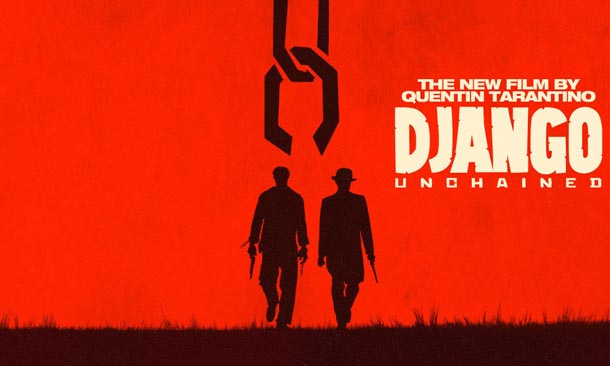Django Unchained, directed and written by Quentin Tarantino, starring Jamie Foxx, Christoph Waltz, Leonardo DiCaprio, Samuel L. Jackson, Kerry Washington.
WARNING: THIS REVIEW CONTAINS MAJOR SPOILERS.
The 'D' is silent, but payback most certainly isn't, in Quentin Tarantino's audacious, explosive and hugely entertaining follow up to 2009's Inglourious Basterds, Django Unchained. After two decades of film-making, Tarantino has finally delivered what Reservoir Dogs, Pulp Fiction, and, most transparently, Kill Bill Volume 2 hinted at with in-jokes, oblique references and allusions: his own fully fledged tribute to the European 'Spaghetti' Westerns of the mid 1960s and 70s. Much like Inglourious Basterds stealing the title of the 1978 exploitation WWII film The Inglorious Bastards, this film's title is taken from the 1966 Django, and from a raft of similar westerns, filmed mainly in Spain and Italy, which used the name 'Django' for their morally questionable heroes. The 'Unchained' in Tarantino's film refers not only to Django's freedom, but also, to the no-holds-barred audacity that you would expect from the film-maker who gleefully concluded his last effort with the blowing up of the entire Nazi high command, history be damned, and to the extreme violence that defined the Spaghetti Western sub-genre. But make no mistake: Django Unchained is far removed from the self-indulgent, misguided tribute to grindhouse exploitation cinema that was Death Proof, proving very much a companion piece to the aforementioned return to form, Inglourious Basterds. And while Django Unchained feels very much like the Leone and Corbucci films to which it pays tribute, it's not beholden to their formulas, giving Tarantino free reign to make a modern, and dare I say it, politically complex Western.
 |
| I like the way you dress, boy: Foxx as a very stylish Django |
Ah yes, Spike Lee, Django's most outspoken critic, who in a futile gesture has called on cinema goers to boycott the film because of extensive use of the word 'nigger'. Of every expletive in English, nothing really comes close to the 'N' word as a truly offensive and incendiary term.. And you can forgive people for their reticence over a director like Tarantino attempting to tackle an issue so completely sensitive as slavery, but to echo Samuel L. Jackson's recent defence of the film, context is everything. People in America in the nineteenth century used that word, and to omit its use would be more conspicuous, more absurd, and more offensive than having overtly racist characters using racist language. Of course, there's no question that the highly aesthetisised violence that runs throughout Django is potentially jarring given the subject, but the director neither shies away from the unspeakable brutality of slavery, nor does he, despite the humour with which he peppers his film, make light of the terrible realities of the pre-civil war Deep South.
More than that, where Inglourious Basterds' climax revelled in its own historical revisionism, a Jewish revenge fantasy to beat all revenge fantasies, Django Unchained is cinematic revisionism, rewriting the Western formula, by Tarantino's own admission, for a folkloric black hero; a fictional, ass-kicking Frederick Douglass (check out Django's unruly mop before his makeover and tell me it doesn't look familiar). Undoubtedly Django Unchained's greatest strength is its gradually shift of narrative agency from Schultz, who liberates an almost mute and passive Django on the condition he assist him in his bounty hunting, to Django himself, who must make the final ascent to self-realisation alone, after Schultz is killed is a faux-climax. In retrospect, then, Waltz's early scene-stealing underlines Django's marginalisation: had the film ended with Schultz and Django riding into the sunset, the film's narrative direction would have remained in Schultz's hands. In other words, his death is absolutely necessary for Django to take centre stage - the scene where Leonardo DiCaprio's revolting Calvin Candi forces Schultz to shake his hand is key to the narrative power structures in the film - and provides one of the smartest and thematically poignant moments in any of Tarantino's films to date. This is Django's true unchaining, liberated not just from physical slavery, but also from Schultz's symbolically binding myth-making. And when Django returns to Candiland cast in a silhouette that is equal parts Ethan Edwards and Indiana Jones, we are witness to his final transformation as a self-made legend of the West. The master's tools may never dismantle the master's house, but for Django, a bag of dynamite should do just fine.
 |
| In a world of villains, Jackson shines as one bad motherfucker. |
Although neither possessing the debutant immediacy of Reservoir Dogs, nor being the game changer that was Pulp Fiction, Django Unchained confirms the return to form that Inglourious Basterds promised, with a bloody, compelling roaring rampage of revenge. As with its predecessor, it's not perfect, and with a running time of nearly three hours, will prove too long, and undisciplined, for some. Moreover, the racial politics have predictably courted controversy, and are sure to be the subject of post-colonial studies in years to come. But Django Unchained is pop-cinema at its best, an acidic splash in the eye to the mirthless, limp formulas and balance sheets under which so many other filmmakers labour. It may be early days yet, but put this down as a contender for one of the best films of the year.

Agree with this excellent review.
ReplyDeleteI'm ashamed I hadn't heard of Frederick Douglas -- but yes the resemblance is remarkable and knowing Tarantino and his depth of knowledge very unlikely to be coincidental.
http://upload.wikimedia.org/wikipedia/commons/thumb/8/85/Frederick_Douglass_c1860s.jpg/220px-Frederick_Douglass_c1860s.jpg
May I suggest that links to information on Jackson and Ethan would be useful to those of us not so well informed as yourself.